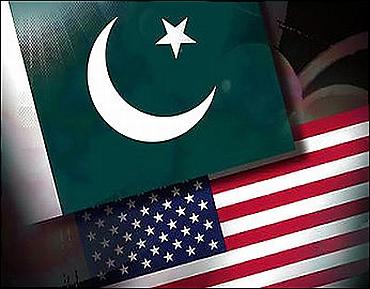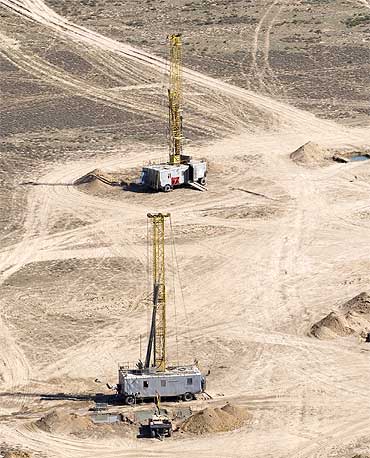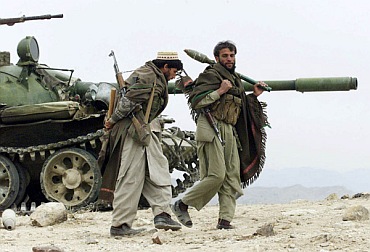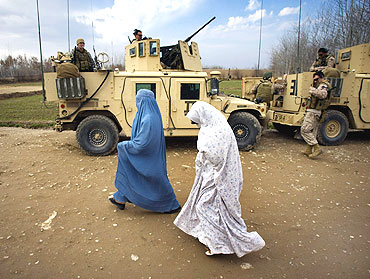
Big-power rivalries in the Central Asian region have catapulted Pakistan into a key role in the US's regional strategy more than at any time, says M K Bhadrakumar.
Pakistan has been, historically speaking, the oldest strategic ally of the United States in the South Asian region. The partnership has been of great importance for the US's regional strategies through the past several decades, although its dynamic and verve might have changed from time to time.
The enduring features of the US-Pakistan partnership can be summarised as follows:
The partnership formed a crucial template of the US's global strategy;
The partnership drew heavily on Pakistan's strategically important location in the region; country, its population base, its economy and so on.
The US took a direct interest in preserving a power structure in Pakistan that was amenable and cultivating the pro-US orientation of the elites, but the accent has always been on the security and military cooperation; The US hoped to play a role in Pakistan's adversarial relationship with India.
During the cold war era US depended on Pakistan as a collaborator in the South Asian as well as Middle Eastern regions in its global strategy to contain the Soviet Union. In the post-cold war era, the partnership inevitably underwent change but Pakistan continues to be no less vital for the US's global strategy today.
The principal thrust of the US's regional strategy during the past two decades can be identified as follows:
Containment policy toward Russia, China and Iran;
Energy security;
Scramble for resources;
The Silk Road;
Struggle against religious extremism and terrorism;
Expansion of NATO as a global security organisation.
This strategy is primarily playing out in the Central Asian region of which Afghanistan becomes a part.
Now, I am going to proceed to place Pakistan with reference to the above templates of the US's regional strategy.
What is at once obvious can be said at the outset, namely, Pakistan's role in the so-called "war on terror" is a mere metaphorical description of a far more profound engagement. Alas, our discourses in India do not quite comprehend this and we keep agonising over the paradigm of a Pakistan locked in an existential struggle with India and relentlessly seeking "strategic depth" in Afghanistan vis-a-vis India, whereas that is only one of the dimensions – and, in my opinion, an increasingly peripheral one.
Why is it that we don't get the big picture? Is it that prejudices die hard, or that pride comes in the way? In a nutshell, we blithely overlook the entire panorama of the big-power struggle in the Central Asian and Caspian hinterland.
Indeed, the US' invasion of Afghanistan in 2001 can also be viewed in this broader context, while the "war on terror" may have provided and immediate context.
In sum, the big-power rivalries in the Central Asian region have catapulted Pakistan into a key role in the US's regional strategy more than at any time.
...

Energy security merits some focused attention in order to appreciate the acuteness of the big-power rivalries in the region. The geopolitics of energy security figures in many ways within the first circle of the US's regional strategy.
Indeed, the politics of energy security is a dominant theme in the 21st century world politics.
Traditionally, Russia exercised control of the Central Asian region's energy exports. The Soviet-era pipeline system gave Russia tremendous advantage in having a say in the region's energy exports. The best example is Turkmenistan which until very recently was almost entirely dependent on the Russian pipeline system for its gas exports. Russia consumed the gas from Turkmenistan and made up for the latter's exports to Europe from its own reserves in the western regions.
American oil companies began penetrating the Caspian region in a big way already by the mid 1990s, especially Azerbaijan and Kazakhstan. With great persistence and after overcoming total opposition from Russia, the Bill Clinton administration pushed through the Baku-Tiblisi-Ceyhan oil pipeline. The security of this pipeline route was probably the single biggest consideration behind the US sponsored 'Rose Revolution' in Georgia in 2004, which was the first major geo-strategic eruption of the simmering scramble of the oil resources of the region.
Various other Trans-Caspian pipeline projects have been mooted by the US since the 1990s but Russia has so far succeeded in stalling them. The most notable among them is the Nabucco pipeline project, which is predicated on the availability of gas supplies from Turkmenistan.
The Russian influence over Turkmenistan still remains considerable although it has diminished over the years. Thus, despite sustained efforts by the west, Nabucco remains a concept while Russia recently commissioned its Nord Stream gas pipeline, which directly connects Germany with the Siberian gas fields, and Russia is pressing ahead with the South Stream gas pipeline (across the Black Sea), which may make Nabucco all but redundant.
The rival claims of South Stream and Nabucco to access Turkmenistan's gas promises to be a keen tussle in the race for Caspian energy and it has implications for the great game in Central Asia.
Unlike the US, China has achieved remarkable success in its energy diplomacy in the Central Asian region. China began developing oil pipelines from Kazakhstan in the last decade and a major gas pipeline from Turkmenistan leading to Xinjiang to which the gas fields of Uzbekistan and Afghanistan can be connected. The pipeline has a capacity of 30 bcm, which China proposes to double by 2015. The expansion work is under way.
Curiously, China has been an indirect beneficiary of the rivalry between Russia and the US. 'Euro-Atlanticism' demands that Europe reduces its high level of Europe's dependence on Russian energy supplies (which meet around 60 percent of the European needs at present). On the other hand, Europe's energy diversification is realistic if only Iran's energy reserves can be tapped, but the US-Iran standoff precludes such a possibility. Presently, therefore, Europe can count only on direct sourcing of energy from Central Asia via pipelines that would bypass Russian territory.
...

Now, to the extent that China's inroads into the Central Asian energy scene eroded Russia's dominant presence, the US used to regard China as a "silent partner" and the two countries in their energy dialogue during the George W. Bush administration used to articulate shared concerns over energy security, including the security of the pipelines. However, with the commissioning of the Central Asia gas pipeline from Turkmenistan to Xinjiang two years ago, the US thinking has undergone a shift.
Last year for the first time, Richard Morningstar, US's envoy on energy security in Eurasia voiced in a senate testimony in Washington the US's sense of disquiet over China's cascading presence in the energy sector in Central Asia and the Caspian.
The US is waking up to the reality that China also is a competitor for Big Oil in the Central Asian energy scene. The US faces a dilemma in so far as it cannot openly oppose China's presence since it runs contrary to US's proclaimed doctrine of multiple pipelines. At the same time, US commentators have played up the China factor to work on Russian sensitivities with the expectation, possibly, that this would retard the Russia-China working relationship within the Shanghai Cooperation Organisation.
On the other hand, Russian interests principally lie in maintaining its hold over the European energy market. Energy is a major geo-political weapon for Russia in influencing the European policies. Besides, energy exports to Europe is a major source of income for Russia and looking ahead, Russia also harbours ambitions to develop the present inter dependency into an altogether new level of energy cooperation with Europe- namely, in terms of Russian companies entering the highly lucrative retail market in Europe and Russian companies acquiring energy assets in Europe.
In short, Russia has long term strategic plans toward the European market and is highly sensitive to moves from any quarter that may lead to an erosion of its pre eminent status as the supplier of energy to Europe. Indeed, Russia believes that its influence on the policies of its energy partners among the major European powers- Germany, France and Italy – is already substantial.
Suffice to say, in geopolitical terms, Russia's preoccupation has been to ensure that Europe did not gain direct access to alternate energy sources in Central Asia. China's imports of Central Asian energy do not constitute a direct threat to Russian interests - so far, at least. Russia may even be quietly pleased that aside meeting the export obligations to Russia and China, Turkmenistan may be left with no surplus gas for direct exports to Europe.
Put differently, Russia and China would even have a convergence of interests in denying the Central Asian energy exports to Europe. Some day in a not-too-distant future, this convergence may provide the leitmotif for the realisation of an 'SCO Energy Club', which was first mooted by Vladimir Putin in 2007. Most certainly, a major consideration for the US to debunk the SCO stems from the fear that it may provide the forum for an Asian energy grid involving Russia, Central Asian states and Iran as energy suppliers and China, India and Pakistan as major consumers.
Interestingly, Iran has recently applied for SCO membership, while Russia has for the first time openly supported Pakistan's SCO membership and has reiterated its interest in participating in both the Iran-Pakistan gas pipeline project as well as TAPI. Russia has also promised to invest 'at least 500 million dollars in a project to bring electricity from Tajikistan to Pakistan via the Wakhan Corridor and the Gilgit-Baltistan region of the Northern Areas.
Now, why is Pakistan so important in the geopolitics of energy?
Let me go back a bit to the Caspian rivalries. So long as the status of the Caspian Sea lies in dispute, the western projects to build pipelines connecting Central Asia with the European market will run into difficulty for the foreseeable future. Russia and Iran would have a common interest in keeping the Caspian Sea issue an unresolved regional problem, which would preclude foreign investments in any trans-Caspian pipeline projects.
Thus, the only pipeline route for evacuating the Central Asian energy resources to the world market happens to be through Afghanistan and Pakistan. In fact, this was a major consideration for the US to support the Pakistani bid to create the Taliban so as to stabilize the Afghan situation in the mid-1990s.
It is worthwhile to recall that almost till the eve of the 9/11 attacks on the US, Washington kept contacts with the Taliban. The Big Oil funded Taliban in the period leading to the Taliban's capture of Kabul in 1996 and even afterward almost until the Al-Qaeda attack on the US embassies in East Africa in 1998. Even after the Bush administration took over in 2009, Condoleeza Rice as the National Security Advisor met the Taliban representatives. These contacts continued almost till the eve of the 9/11 attacks.
The US State Department undertook an active diplomatic campaign in the Central Asian capitals in the mid-1990s to the effect that the Taliban could be a factor of regional stability if they succeeded in stabilizing Afghanistan and that it was an indigenous Afghan movement which had no intention to project militancy into the neighboring countries of Central Asia. The US actually encouraged Uzbekistan and Turkmenistan to establish contacts with the Taliban regime in Kabul in the 1996-98 period.
The US expectation was that Taliban would safeguard a gas-cum-oil pipeline connecting the Central Asian region with the Pakistani port of Karachi. It is difficult for me to be categorical, but, conceivably, the involvement of Russia and Iran with the anti-Taliban resistance led by the Northern Alliance was to some extent at least motivated by the anxiety to frustrate the US's Silk Road project.
...

That brings me to the magic of the 'Silk Road', which also passes as the 'great game'.
The Silk Road has several objectives. First and foremost, it aimed at loosening up Russia's pre-eminent position in Central Asia. During the George W Bush administration, the US projected the 'Greater Central Asia strategy', which envisaged Afghanistan being a 'hub' connecting Central Asia and South Asia. The US hoped to roll back Russian influence in Central Asia by developing the Silk Road that bypassed Russian territory and connected the region with Karachi. Thus, even while engaged in the Afghan war, Pentagon commissioned a detailed study regarding the mineral resources in Afghanistan and how to protect their transportation route via Pakistan to the western market.
(Professor Richard Starr of Johns Hopkins was the original great architect of the Silk Road, when he choreographed in the mid-1990s the immense possibilities of a transportation route under US initiative via Taliban-ruled Afghanistan heading to the Pakistani port of Karachi.) No wonder, the NATO's post-cold war strategic concepts visualize a role for the alliance in safeguarding the security of the energy pipelines.
Equally, the US hopes that the Silk Road will subsume or frustrate China's efforts to develop communication links through Central Asia and Pakistan heading toward the Persian Gulf and African markets. These links are vital for China as they bypass Malacca Straits; and for the same reason, US would block such links from being developed. (The US strategy toward Myanmar has the very same objective of blocking China's direct access routes to the Indian Ocean.)
Again, Pakistan's role is going to be crucial for the success of the New Silk Road. (By the way, Barack Obama administration has rechristened the 'Greater Central Asia strategy' as 'New Silk Road'.) Russia and China effectively used the SCO to block the 'Greater Central Asian strategy'. In the run-up to the recent Istanbul conference on Afghanistan on November 2, Russia, China and Pakistan coordinated with each other to pre-empt the US plans to impose a regional consensus on the New Silk Road and the attendant political underpinning of an OSCE-type regional security architecture for Central and South Asia.
The sustained efforts by Russia to strengthen ties with Pakistan are principally attributable to the perceived need in Moscow to strengthen Pakistan's strategic autonomy and its capacity to withstand the US pressure to join the New Silk Road.
Unsurprisingly, Russia, China and Pakistan are opposed to the US plans to establish military bases in Afghanistan. Russia and China visualize that the US seeks to expand its presence in Central Asia. Also, they suspect that it is a matter of time before the NATO (which is also seeking long-term military presence in the region) deploys the US's missile defence system in Afghanistan, which of course would significantly boost the US capacity to debilitate their strategic capability.
Let me take a short detour here. The Russian military doctrine factors in that the US still pursues its cold-war objective to establish nuclear superiority. Given the massive erosion of the Russian conventional capability after the collapse of the Soviet Union, Russia places high importance on its nuclear capability for maintaining the overall strategic balance with the US. Thus, any deployment of the US missile defence system in South Asia is fraught with very serious consequences for Russia's security.
...

Now, to return to Afghanistan, therefore, the US and NATO will be heavily dependent on Pakistan for the transit route to supply its military bases in Afghanistan on a long-term basis. Russia is unlikely to allow the Northern Distribution Network to be used to supply the US military bases in Afghanistan. As a matter of fact, Moscow has already begun circling the wagons.
The new leadership in Kyrgyzstan, which is close to Moscow, has indicated that in 2014, it proposes to ask the US to vacate the Manas air base, which presently acts as a hub for the rotation of US troops deployed in Afghanistan. Putin, who is expected to return to the Kremlin in March 2012 has announced that his number one foreign policy priority will be the creation of a Eurasia Union, bringing together the former Soviet republics in Central Asia. Kazakhstan has recently formed a Customs Union with Russia. Kyrgyzstan and Tajikistan are also expected to join the Customs Union. The main thrust of these integration processes is to keep the US away from Central Asia.
The imperatives of the Central Asian security scenario are such that Russia and China would expect Pakistan to resist the US regional strategy with regard to New Silk Road and the establishment of US-NATO military bases in Afghanistan. On the other hand, Pakistan becomes the vital chip for the US to advance its regional strategy in Central Asia. The big-power struggle to co-opt Pakistan is likely to accelerate in parallel with the Afghan endgame.
Yet another template is with regard to the US's containment strategy toward Iran. The US hopes to use the military bases in Afghanistan to pressure Iran. The US intelligence has used Pakistani territory to stage covert operations inside Iran. The US has been fostering the terrorist organisation known as Jundullah for this purpose. However, with the deepening chill in US-Pak relations, Islamabad and Tehran have drawn close to each other.
Pakistan has categorically dissociated itself from the US's containment policies toward Iran. Tehran has gained from the summary expulsion of hundreds of US security operatives based in Pakistan. Suffice to say, there hasn't been a single Jundullah operation inside Iran in the past 11-month period. Again, Iran opposes tooth and nail the idea of US military bases in Afghanistan. This has become the number one priority in Iran's Afghan policy so much so that Tehran has been rendering low-key assistance to the Taliban.
All factors taken into consideration, therefore, US-Pakistan strategic partnership is at a crossroads today. The past patterns that prevailed until recently do not exist anymore. Pakistan is no more a US proxy to prick the 'soft underbelly' of Russia in Muslim Central Asia. Nor is it willing or interested in injecting the virus of militant Islam into Xinjing; the ties with China are far too precious to be jeopardised.
On the contrary, the US regional strategy in Central Asia, which aims at countering China's rise and Russia and Iran's regional surge, is heavily predicated on Pakistan's cooperation. The establishment of US-NATO military bases in Afghanistan can lead to the deployment of US's missile defence system in the region, which would significantly weaken Russia and China's strategic capability.
But these military bases have to be supplied through Pakistani transit routes. For the New Silk Road project to be viable, Pakistan has to facilitate the use of Karachi and Gwadar ports. Apart from Myanmar, Pakistan is the only country, which can offer to China an access route to the Indian Ocean bypassing Malacca Straits. Again, Pakistan's "neutrality" vis-a-vis the US-Iran standoff provides Tehran with much-needed strategic space in the east.
...

In sum, Pakistan becomes the key player in the US's containment strategy toward Russia, China and Iran. And, conversely put, without Pakistan's cooperation, US's regional strategy will be at an impasse. And, put still a bit differently, Pakistan also happens to be the key to the Russian and Chinese counter-strategy.
However, the prospects of the trust and mutual confidence returning to the US-Pakistan relationship are not good at all. And without such trust, a strategic partnership becomes impossible. It is useful to view the paradigm from the Pakistani viewpoint.
The current phase of serious breakdown in the US-Pakistan relationship can be traced to the Raymond Davis affair. Davis was a key CIA operative who visited Pakistan frequently and obviously he was on the Pakistani military's watch list. His 2-month long detention in January (despite Obama's personal demarche) and his sustained interrogation by the Pakistani Inter-Services Intelligence [ISI] has exposed the extent of US intelligence penetration of the Pakistani security agencies and the military as well as the militant groups operating on the Afghan-Pakistan border. Pakistan reacted strongly by expelling the US operatives and military advisors and rejecting the US military assistance.
Pakistan is insisting that all further US intelligence activities have to be routed through the ISI. A compromise formula is yet to be worked out.
Meanwhile, Pakistan is incensed that the US bypassed it and established contact with the Taliban and even held secret meetings even while professing that Pakistan has a legitimate role in the reconciliation with the Taliban.
Third, Pakistan suspects that the US deliberately pulled out its troops from the eastern Afghanistan region in order to provide a safe heaven for the various Pakistani military groups. Pakistan believes that the US is instigating a low-intensity war by encouraging some of these groups to undertake cross-border attacks on the Pakistani military in retaliation for Pakistan's refusal to crack down on the Haqqani Network in North Waziristan.
On its part, therefore, Pakistan refuses to bring the Taliban – its so-called "strategic assets" – to the negotiating table unless and until there is transparency in the US intentions toward Pakistan. All indications are the Pakistani military estimates the probability of US attempts some day to seize Pakistan's nuclear assets under some pretext.
Thus, the air is thick with mutual suspicions and it adds to the broader insecurities in the Pakistani mind regarding Indian military build-up, US-India strategic partnership and so on.
Pakistan has concluded that the permanent US military bases in Afghanistan will pose a threat to its security. It is unlikely to cooperate with the US in the Afghan endgame as long as large-scale US presence continues in Afghanistan.
On the other hand, the US objective is to bring the war to an end in Afghanistan by reconciling the Taliban so that the long-term military presence becomes sustainable financially. Continued bloodshed and war casualties inflame western public opinion and the current budgetary environment disallows the prolongation of the conflict.
In short, there is a fundamental contradiction in the Afghan endgame, which has resulted in the current breakdown of the peace process.
This contradiction assumes an added dimension when we factor in that Pakistan shares common concerns with other regional powers – Russia, China and Iran – with regard to the Afghan endgame.
Let me conclude with a highly provocative observation.
We in India are stuck in a groove, fixated on old notions regarding Pakistan's Afghan policies. The heart of the matter is that the Pakistan's Afghan policies have evolved and they are nowhere near India-centric anymore.
Pakistan has a healthy awareness of the limits to Indian influence in Afghanistan. The Pakistani focus is on the US strategy in Afghanistan and on fastening its legitimate interests such as Durand Line. Pakistan is conscious that unlike at anytime in the past, it today has a range of options to safeguard its national interests.
Pakistan can be expected to work closely with Russia and China, in particular, in the Afghan endgame. At the recent SCO heads of government conference in St. Petersburg, Pakistani prime minister Yousuf Gilani pledged in front of Russian and Chinese prime ministers Vladimir Putin and Wen Jiabao that a durable settlement in Afghanistan can be reached only if it is inclusive with the participation of all ethnic groups. The Taliban leadership's statements in the past year also have reflected this "new thinking".
Pakistan already finds it difficult to "control" the Taliban groups. Large-scale poaching by foreign intelligence agencies is happening and Taliban still refuse to recognise the Durand Line. Pakistan does not have the financial resources to bankroll a Taliban regime in Afghanistan. Saudi Arabia and the UAE are unlikely to annoy the US when the Arab Spring is blowing by funding the Pakistani adventures directed against western interests in Afghanistan, as they did in the 1990s.
As for China, we know it is doing some plain-speaking to its "all-weather friend" that he had better rein in the forces of militancy and terrorism that are threatening Xinjiang. Russia also hopes to forge a strategic partnership with Pakistan and would expect moderation in Pakistan's Afghan policies. Iran of course will never countenance a Taliban-ruled Afghanistan.
So, where does it leave Pakistan? What lies ahead?
We may expect Pakistan's formal induction into the SCO at the summit next year. Pakistan is eagerly looking forward to the SCO membership for the strategic space it will create for it to withstand US pressure. Pakistan hopes that the SCO will assume a lead role in the Afghan endgame in the post-2014 period and that will obviate the need for the US military bases or at the very least will break the US monopoly over conflict resolution in Afghanistan.